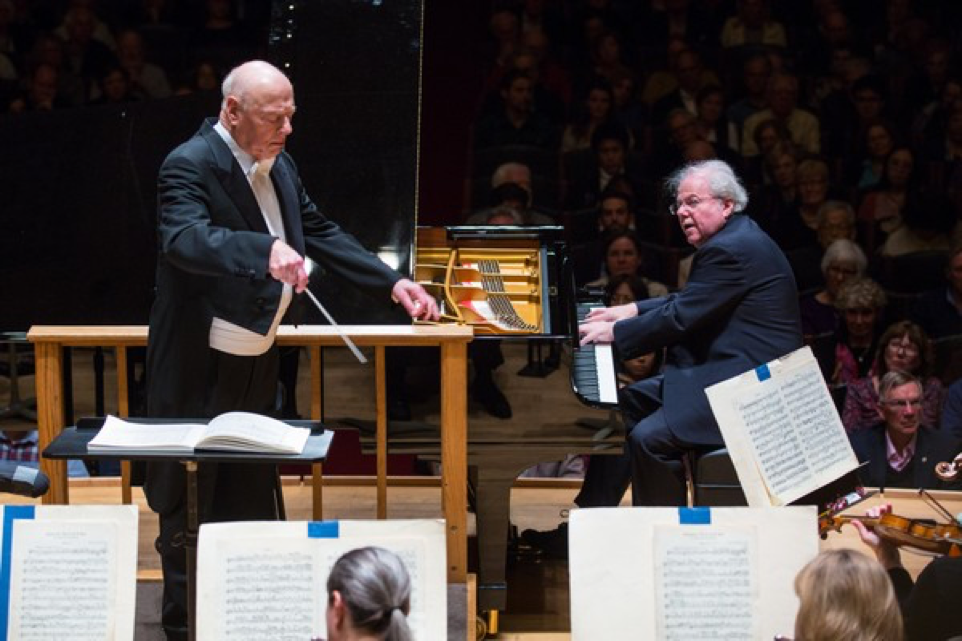Two Masters and One Protégé: Ax, Haitink, and debut of principal cellist Blaise Déjardin

Courtesy of Robert Torres
The Boston Symphony Orchestra’s all-Brahms program last Saturday night was beautifully and boldly presented. The concert not only featured two of the classical music world’s most distinguished musicians – pianist Emanuel Ax and conductor Bernard Haitink – but also the debut of the BSO’s new principal cellist, Blaise Déjardin.
Before the concert even started, the audience showed their support for the two masters Ax and Haitink as they walked onto the stage. The 2nd Piano Concerto of Brahms opened the program. Haitink and Ax have performed the piece countless times together and have even recorded the piece in 1999 with the BSO for Sony Classical. From beginning to end, Haitink and Ax demonstrated their mastery of the piece.
In an interview with WHRB, Mr. Ax admitted that he practices the 2nd Piano Concerto of Brahms regularly. He told us, “It’s very difficult, and I hope that some parts of it get better as I get older. It’s not always the case, but you try.”
That statement proved true. While not completely technically flawless, Ax’s rendition was nevertheless a joy to experience. His experienced musicality especially shone through during his seamless transitions from grandiose to graceful and vice versa. He played virtuosic runs and lyrical melodies with equal ease, and throughout, he exuded such confidence that the audience could not help but be convinced by his interpretation. Furthermore, his eagerness to play was reflected in his occasional smiles which directed towards both Haitink and the orchestra, and this pleasure he derived from performing was thoroughly enjoyed by the audience.
The audience’s attention shifted towards cellist Déjardin as he opened the third movement of the piano concerto with an intimate solo. He perfectly captured the nostalgic nature of the movement which contrasted with the intense urgency of the previous two movements. Although this was his first program performing as principal cellist of the BSO, and despite the fact that he was playing in the presence of two “greats,” Déjardin played confidently – perhaps because he had already played under Haitink as a student at the Paris Conservatory in the European Youth Orchestra. Although many younger classical musicians are known for playing in a more dramatically virtuosic style, Déjardin instead chose to play with restraint – he maintained a calm demeanor, he used minimal rubato and he employed a tasteful vibrato. His debut as principal cellist did not go unnoticed – when Ax pulled him to the front of the stage following the performance, he garnered appreciative applause.
After the intermission, the idyllic 2nd Symphony of Brahms was impressively led by Haitink. As is his style, Haitink provided just enough detail in his movements to direct the orchestra. This understated leadership allowed the orchestra to shine. The opening horn solo by Richard Sebring was flawlessly executed and provided a glimpse of the masterful performance to come. Like Ax in the piano concerto, the orchestra played as if for the first time, though most members had probably played the famous work before. The ecstatic subito forte section after the almost imperceptible opening of the fourth movement, for example, was a wonderful surprise to audience members unfamiliar with the piece. Very rarely, the front of the first violins, in their enthusiasm, were overpowering, but for the most part, the strings united to create a lush and luxuriously rich sound.
Haitink, Ax, Déjardin, and the BSO were lavishly applauded with multiple standing ovations at the close of the concert. Audience members were rewarded last Saturday with performances by not only two of classical music’s greatest celebrities but also the debut performance of the BSO’s new principal cellist. Haitink, after his final bow, humorously closed the score of the Brahms Symphony, eliciting laughter from the public. His “mic drop,” like the rest of the all-Brahms evening, was executed confidently and gracefully, and moreover, was appreciated by all in the audience.
Allison Pao is a radio host for WHRB Classical.